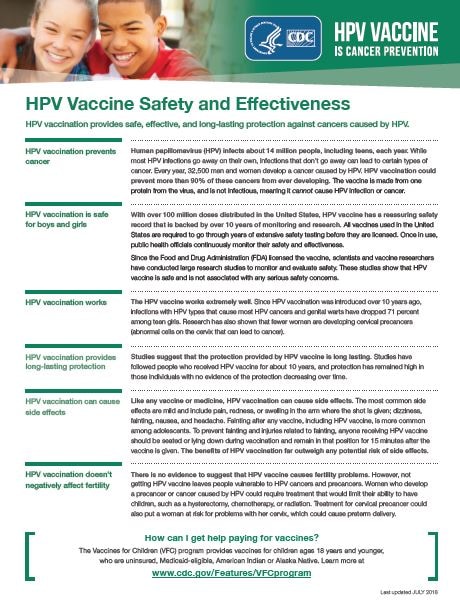HPV Vaccination is Safe and Effective
HPV vaccination provides safe, effective, and long-lasting protection against cancers caused by HPV.
HPV vaccination is very safe
Each HPV vaccine— 9-valent HPV vaccine (Gardasil® 9), quadrivalent HPV vaccine (Gardasil®), and bivalent HPV vaccine (Cervarix®)—went through strict safety testing before the U.S. Food and Drug Administration (FDA) licensed them. Over 15 years of monitoring and research during the vaccination program have continued to show that HPV vaccination is safe.
Gardasil® 9 was studied in clinical trials with more than 15,000 females and males.
Gardasil® was studied in clinical trials with more than 29,000 females and males.
Cervarix® was studied in clinical trials with more than 30,000 females.
Each vaccine was found to be safe and effective in clinical trials. Since late 2016, Gardasil® 9 has been the only HPV vaccine available for use in the United States.
As with all approved vaccines, CDC and FDA closely monitor the safety of HPV vaccines. Any detected safety concerns are reported to health officials, healthcare professionals, and the public.
More than 135 million doses of HPV vaccines have been distributed since they were licensed. Data continue to show the vaccines are safe and effective.
Possible side effects

Vaccines, like any medicine, can have side effects. Common side effects from HPV shots are mild and get better within a day or two. These include:
- Pain, redness, or swelling in the arm where the shot was given
- Fever
- Dizziness or fainting (fainting after any vaccine, including HPV vaccine, is more common among adolescents than others)
- Nausea
- Headache or feeling tired
- Muscle or joint pain
To prevent fainting and injuries from fainting, adolescents should be seated or lying down during vaccination and for 15 minutes after getting the shot.
Tell the doctor or nurse if your child has any severe allergies, like an allergy to latex or yeast.
HPV vaccines are made from one piece of the virus. They are not infectious. This means that they cannot cause HPV infections or cancer.
HPV and fertility
HPV vaccine does not cause fertility problems.
Not getting HPV vaccine leaves people at risk for HPV cancers and precancers (abnormal cells that can lead to cancer).
- People who develop a cancer caused by HPV will need treatment that can sometimes limit their ability to have children, such as a hysterectomy (for women), chemotherapy, or radiation.
- Treatment for cervical precancer could also put women at risk for problems with their cervix, which can sometimes cause preterm delivery.
HPV vaccination is preventing cancer-causing infections and precancers
HPV infections and cervical precancers have dropped since 2006, when HPV vaccines were first used in the United States.
- Among teen girls, infections with HPV types that cause most HPV cancers and genital warts have dropped 88 percent.
- Among young adult women, infections with HPV types that cause most HPV cancers and genital warts have dropped 81 percent.
- Among vaccinated women, the percentage of cervical precancers caused by the HPV types most often linked to cervical cancer has dropped by 40 percent.
Long-lasting protection
The protection provided by HPV vaccines lasts a long time. People who received HPV vaccines were followed for at least about 12 years, and their protection against HPV has remained high with no evidence of decreasing over time.
Read more: Summaries, reports, and frequently asked questions about HPV Vaccine Safety.

